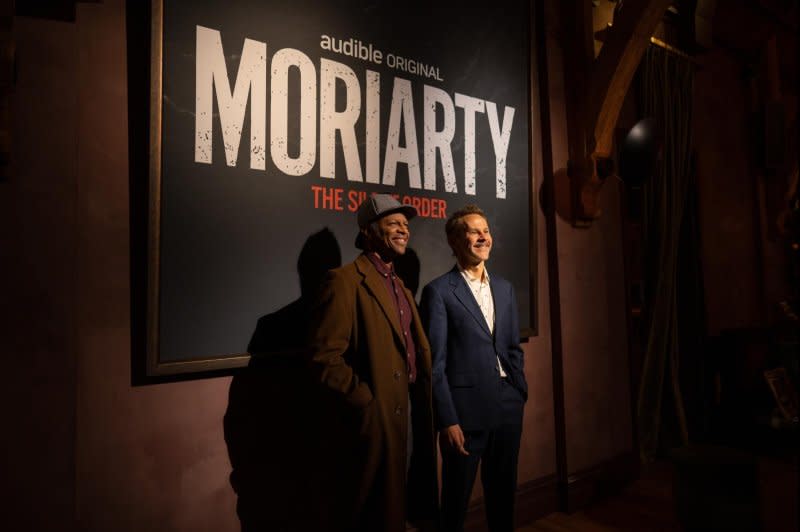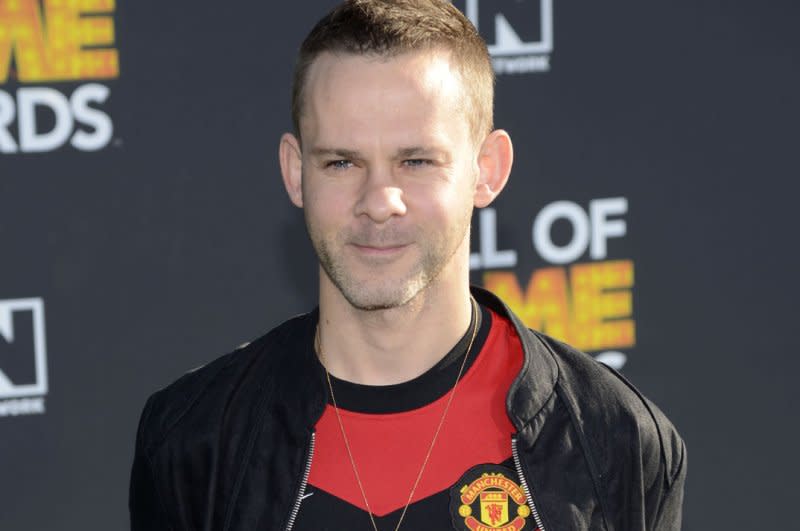Dominic Monaghan: Everything bigger in S2 of 'Moriarty' Audible Original

NEW YORK, Nov. 10 (UPI) -- Lost and Lord of the Rings actor Dominic Monaghan says "everything got bigger" in Season 2 of his Audible Original series, Moriarty.
Inspired by the works of Sir Arthur Conan Doyle, the scripted audio drama is in a second season subtitled The Silent Order. It casts Monaghan as the titular, Victorian-era, British professor, while Futurama, Mad TV and Pulp Fiction actor Phil LaMarr plays renowned sleuth Sherlock Holmes.
The men are still rivals, but this version of the mythology subverts literary tradition and portrays Moriarty not as a villain, but as a wronged man whose life's work in mathematics is snatched while he defends himself against a wrongful murder charge.
Holmes' motives for getting Moriarty put behind bars and destined for the hangman's noose are murky at best.
"It was important in the first season to base things in London. It's where they both live," Monaghan told UPI in a sit-down interview in New York on Thursday night.

"It's the streets that they know. It's the world that we know -- the Arthur Conan Doyle world, but, in the second season, they become more ambitious with their storytelling," he said.
"Crimes become bigger. You have the same two iconic characters [from Season 1], but now they are pushing how big they want to be in the world. "

Lifelong Sherlock Holmes fan LaMarr was eager -- in these 10 new episodes -- to give the private detective a level of vulnerability not exhibited in past incarnations of the character.
"Moriarty, Holmes' nemesis, becomes the protagonist and Holmes becomes the villain, but it's the same personality," LaMarr said. "Sherlock Holmes is a complicated personality. Him doing these things -- and us having a different interpretation for why -- tracks."
None of the other stories LaMarr ever read explored the character from this angle.
"Doyle wrote him as a hero -- with cocaine -- but still a hero," LaMarr laughed.
Monaghan added: "But, also, rude and can't really talk to people and not great with women or authority.
"There are little indicators there, but as [LaMarr] said, he is a full-on hero in Arthur Conan Doyle's stories," he said. "He gets the girl and gets the bad guy, whereas, in this, he is much more human, much more layered."
Holmes and Moriarty interact more in the new episodes than they did in Season 1.
"I need him, but I don't like him. He's so annoying!" LaMarr summed up Holmes' opinion of Moriarty. "Those scenes were so fun!"
Moriarty, as he has been depicted in the past, wasn't a character Monaghan felt particularly sorry for or protective of before signing up for this remixed role.
"You have to feel sympathy for the characters you play. I wasn't necessarily always drawn to Moriarty like he's misunderstood or gets a bad rap," he said.
Monaghan said he didn't approach his vocal performance differently for this audio-only presentation than he has for projects that eventually were given visual components, such as cartoons or documentaries.
"You're a little confined by what you can and cannot do. Obviously, you've not got a director that says, 'You're going to walk from here to here and the camera's going to follow you.' Because you're in front of a microphone and you can't really move," he said.
"In terms of, at least what I'm trying to bring, I'm still looking at the text. I'm still breaking down whether this looks like a Moriarty sentence," Monaghan added. "I love the fact that it's just the voice because now the listener creates the rest. ... It's all in your head."
LeMarr noted the actors who use their imaginations as they perform in this series often are surprised when they listen to the finished product with all of the texture sound effects and music give it.
"They capture the feeling of the period better than some on-screen movies lately," he said.
Monaghan agreed.
"I love how they realized London in the first season. I was so taken with the cobbled streets and the horses and the cries of market sellers and stuff like that," he said.
Season 2 takes the mystery-solving to turn-of-the-century New York.
"You can kind of feel like the skyscrapers are being built around you, this modern-day New York starting to form itself around the characters," Monaghan said.
He is proud to say he recently got his mother -- a huge reader -- into audio books. Her favorite, of course, is Moriarty.
"She loves the look of that period, the clothes and that world of mystery and intrigue," he added. "I love the fact that I'm making something that makes my mother says, 'Yay, it's coming back!'"
Monaghan said he tried not to let other actors' screen portrayals of Holmes and Moriarty impact his own performance, choosing instead to look for insight in Conan Doyle's canon.
"it would be tricky to look at Benedict Cumberbatch's Sherlock and the Moriarty in that show and say, 'I'm going to take a little piece of that,'" Monaghan said. "You're getting paid so that you're creating something new."
He said he has not discussed his latest project with Cumberbatch and Martin Freeman, who played Holmes and his partner John Watson on the BBC's popular modern-day drama, Sherlock, even though they are acquainted, having all worked with filmmaker Peter Jackson on adaptations of J.R.R. Tolkien books.
Monaghan remembered running into Cumberbatch and Freeman at a BAFTA lunch just before they headed off to star in Jackson's Hobbit trilogy around 2011.
"They wanted to know what New Zealand is like, what Pete's like," Monaghan recalled, noting that if he knew at the time he'd be playing Moriarty, he would have picked the actors' brains about that in return.
"The amount of fast-paced, speedy monologues was very impressive. [Cumberbatch] is brilliant."
LaMarr credited Conan Doyle's imagination as the reason why characters he created more than 100 years ago are still being reimagined by other writers and actors in 2023.
"He's like King Lear," the actor said of Holmes.
"He's a fantastic character, and even though people have played him for generations, that doesn't change what you have to do as an actor. You interpret the script, you play the scenes and you bring out the heart of the character."
Stories about Holmes and Moriarty also have timeless themes, Monaghan pointed out.
"We want to save the day. We want to solve the crime. We want to help people. We want to have it figured out. We want to have the answers," Monaghan said.
"For all of those great [qualities] he has, he also really struggles with relationships and struggles to pay rent because he's blown it all on drugs. He's an alcoholic. He's paranoid. He's human. That's what I love about these characters. They're human."


